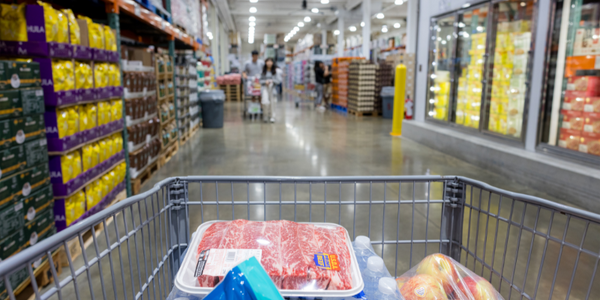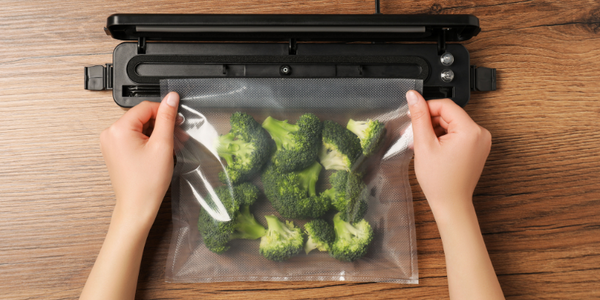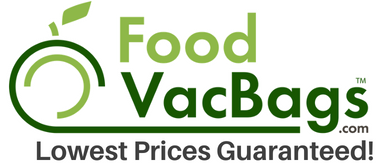Posted on July 19 2019

Have you ever wondered if there are foods you should not be vacuum sealing? There are many foods you can vacuum seal for extended freshness; unfortunately there are a handful that you should not preserve using this method. Some foods contain anaerobic bacteria, which can grow without the presence of air. Within a vacuum sealed pouch, with reduced oxygen, these bacteria will grow and may pose a risk to your health.
Do not vacuum seal:
- raw mushrooms
- garlic
- soft cheeses (blue cheese, brie, camembert, ricotta and other soft and unpasteurized cheeses)
- freshly cooked or steamed vegetables (safe to vacuum seal after they are at room temperature)
In addition, many common vegetables emit a gas when stored. If these vegetables - in the Cruciferae or Brassicaceae family - are kept in a vacuum sealed bag, this gas will cause them to spoil. To store these vegetables properly they should be blanched, dried, then vacuum sealed and frozen for storage.
Blanch first:
- arugula
- bok choy
- broccoli
- brussels sprouts
- cabbage
- cauliflower
- kale
- radishes
- turnips

Related Posts

11 Plants To Keep Mosquitoes Away All Summer Long

The Six Rules To Follow When Buying In Bulk




Hi Susan – The answer is yes. You can vacuum seal vegan cheese. If the fridge life of the cheese is long enough for you to enjoy it to the last bit, I would not put it in the freezer. However, you can freeze most vegan cheeses. You should keep in mind that the texture and taste will be affected. A lot also depends on the type of vegan cheese you are using.
HI Kiran – I’m not sure what you mean by gravy meat.
You certainly can vacuum seal gravy. However, you would still need to either freeze it or keep it in the fridge. In the fridge, it would be good for 3 or 4 days, in the freezer it should be good for up to 6 months.
Hi Db – From what I’ve found this is it’s pretty safe for a pup. I would try to keep the food frozen as long as possible. If it thaws out too much, I’ve looked into what “leftovers” are acceptable for dogs. What I found is typically, food that has been cooked but left in the fridge (or cooler) for the past week is safe to feed your dog. These are classic “leftovers” but they are a just few days past what many humans find “acceptable”. If there isn’t any visible mold growing on the food, chances are you are safe to feed it to your dog.
I’m taking a long road trip (12 days) I have to prepare meals for my dog due to his health (Almost lost the boy) and I vacuum seal each meal and freeze In a deep freeze. I will be placing them in an ice chest for the trip. They will start out hard frozen and will remain on ice. The packs contain cooked rice, meat, canned pumpkin and raw eggs. If they remain on ice will they be safe for the duration of the trip? I have searched and searched for help in this but can’t get a good answer. I would appreciate guidance.
Hi Barbara – We do not recommend vacuum sealing blue cheese.
Hi Johnna – The acidity of the yogurt, and keeping it cold, retards spoilage. I don’t believe vacuum sealing it will extend it’s freshness.
Hi Pat – Hi Pat
FoodVacBags are safe to thaw food in. These are the guidelines suggested by the USDA for Safe Thawing:
Safe Thawing
Never thaw foods in a garage, basement, car, dishwasher or plastic garbage bag; out on the kitchen counter, outdoors or on the porch. These methods can leave your foods unsafe to eat.
There are three safe ways to thaw food: in the refrigerator, in cold water, or in the microwave. It’s best to plan ahead for slow, safe thawing in the refrigerator. Small items may defrost overnight; most foods require a day or two. And large items like turkeys may take longer, approximately one day for each 5 pounds of weight.
For faster thawing, place food in a leak proof plastic bag and immerse it in cold water. (If the bag leaks, bacteria from the air or surrounding environment could be introduced into the food. Tissues can also absorb water like a sponge, resulting in a watery product.) Check the water frequently to be sure it stays cold. Change the water every 30 minutes. After thawing, cook immediately.
When microwave-defrosting food, plan to cook it immediately after thawing because some areas of the food may become warm and begin to cook during microwaving.
Hi TJ – The answer is yes, you can vacuum seal fresh tomatoes. Just be sure to use a delicate setting on your machine so you don’t squish it. However, if you are planning on freezing them, the texture of the tomato may change and become limp after thawing. This may be fine for soups, stews or sauces. However, if you are looking for a nice chopped tomato, I wouldn’t recommend freezing.
Hi Tate – From the research I’ve been able to do, as long as you get as much air out as possible and have a good seal, you shouldn’t have any issues resealing and refreezing uncooked rice and beans. I don’t believe there would be a reason to unthaw and re-dry it.
Cooked food with sauce is easily stored in vacuum seal bags. After your meal has been cooked thoroughly and cooled off you can seal them by portions with the vacuum sealer. Later, pull them out of the freezer and warm them up for a quick, hot meal.
can you vaccum seal cooked food with sauce? Can we freeze, then vaccum seal?
iPatch – The first step in storing dehydrated food is to make sure the food is fully and properly dried. Cool the food completely; warm food can sweat, causing moisture that contributes to mold growth.
Dehydrated foods should be stored in a cool, dry, dark area; higher temperatures cause shorter storage durations. Dried food typically can be stored for one year at 60 degrees F but for only six months at 80 degrees F. Dried vegetables typically have half the shelf life of dried fruits. For best flavor and increased shelf life, freeze or refrigerate dried jerky.
Hi Donna – Yes you can vacuum seal and freeze mozzarella balls! The trick is in the thawing process. Never move your cheese from the freezer directly to the counter. Always thaw your fresh mozzarella for about a day in your fridge before you plan on using it. The fridge is warm enough to start the thawing process without damaging the texture or taste.
Hi Michelle! Yes, you can vacuum seal coconut flakes. If you choose to seal and freeze the coconut, it will last for about a year in your freezer.
Hi there, Can I vacuum seal coconut flakes? If yes, how long will they stay fresh/safe? Thanks!
Sir can I vacuum seal gravy meat without using refrigerator for 6 months
Hello Nina, yes you can vacuum seal sauerkraut then refrigerate or freeze.
Bernadette, yes, rice can be vacuum sealed.
Can rice be vacuum sealed?
Can you vacuum seal fermented vegetable produts, like sauerkraut?